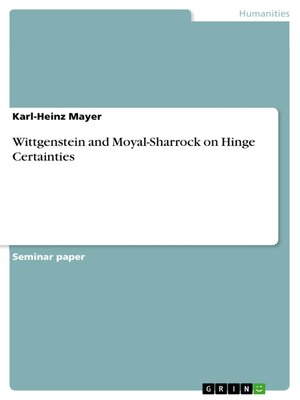
Sign up to save your library
With an OverDrive account, you can save your favorite libraries for at-a-glance information about availability. Find out more about OverDrive accounts.
Find this title in Libby, the library reading app by OverDrive.



Search for a digital library with this title
Title found at these libraries:
| Loading... |
Seminar paper from the year 2014 in the subject Philosophy - Philosophy of the 20th century, grade: 1,0, University of Vienna (Institut für Philosophie), course: Wittgensteins Philosophische Untersuchungen, language: English, abstract: Wittgenstein's use of the word "hinge" for intrinsic certainties, which are forming an unconscious, unjustified foundation of our acting, has spurred an intense discussion in contemporary epistemology. In the build-up of secondary literature about Wittgenstein's late collection of reflections that his literary executors published under the title On Certainty, Danièle Moyal-Sharrock plays an important role with her book "Understanding Wittgenstein's On Certainty" (2005) and a number of other publications.
In her book, she has placed particular weight on the concept of hinges, ascribing to them eight particular properties and vigorously denying them the status of being propositions. Other epistemologists have responded and articulated deviating views.
The debate is still going on and this paper attempts to explain, first and foremost, what Wittgenstein wrote about hinges and the concepts interrelated to them, such as doubt, certainty, foundation, and acting. Then I'll summarize, and partly criticize Moyal-Sharrock's position. I shall argue that her accentuation of the nonpropositionality of hinges is a bit exaggerated, a point of view that is also confirmed by some counter-arguments by Annalisa Coliva, who suggests a conciliatory resolution of the conflict. Finally, Moyal-Sharrock gets the last word, though not entirely convincing.






